Learn how to make your own laundry detergent using just a handful of natural ingredients. I make 5 gallons at a time to last over 300 loads of laundry!
This homemade laundry soap is a great way to reduce waste; it works great and is simple to make!
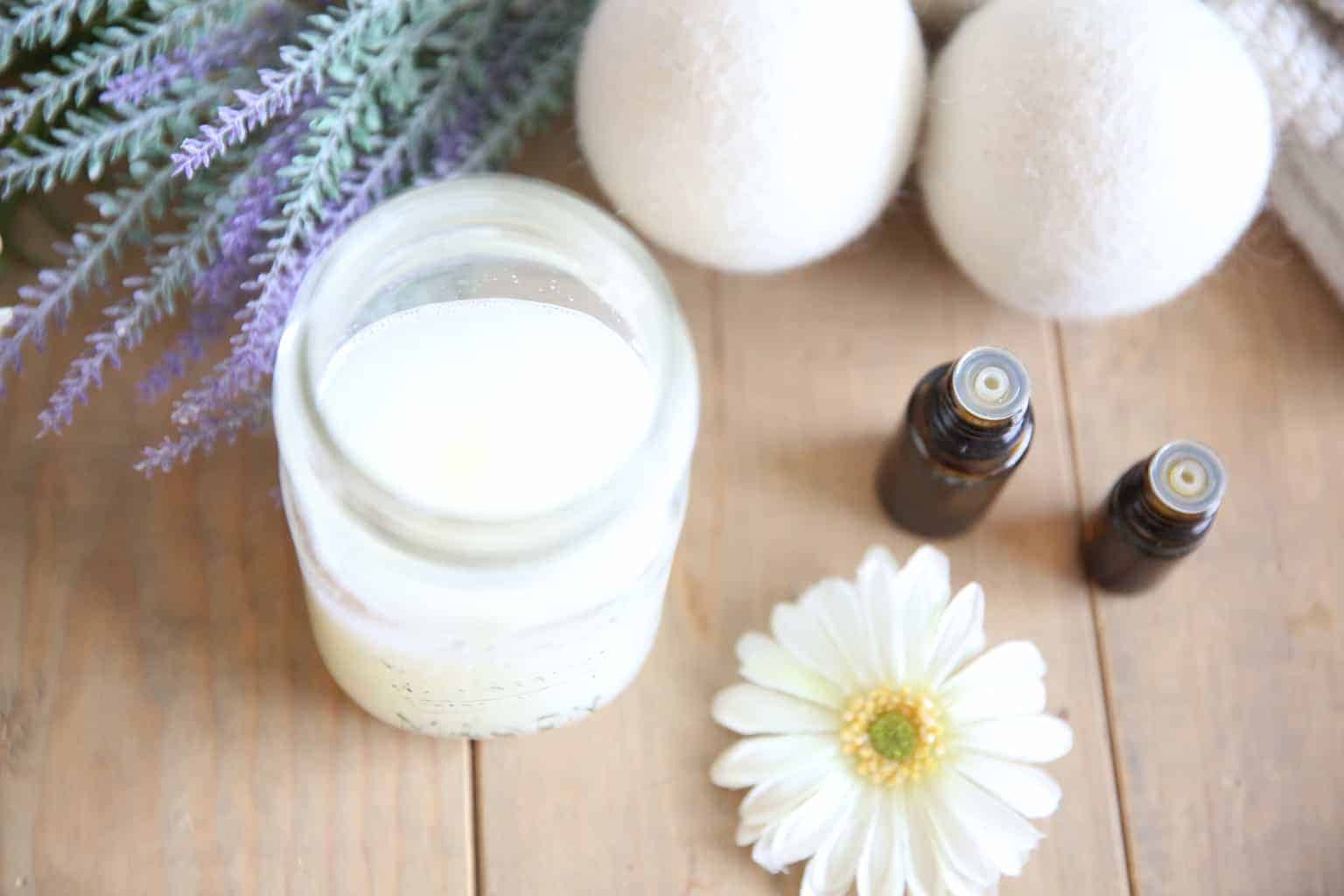
This is a great recipe for anyone who is just getting into making their own laundry products. It requires very little time, ingredients, or upfront costs.
In fact, it takes less than 20 minutes from start to finish to make 5 gallons of all-natural laundry soap. I have been using this soap for over 10 years now, and it has saved me so much money.
And don’t worry about missing your old detergent scent. I use essential oils to match nearly every laundry detergent scent. (check out the different blends below!). On the other hand, it’s easy to omit the oils for unscented laundry soap; either way, this laundry soap recipe will work for everyone!
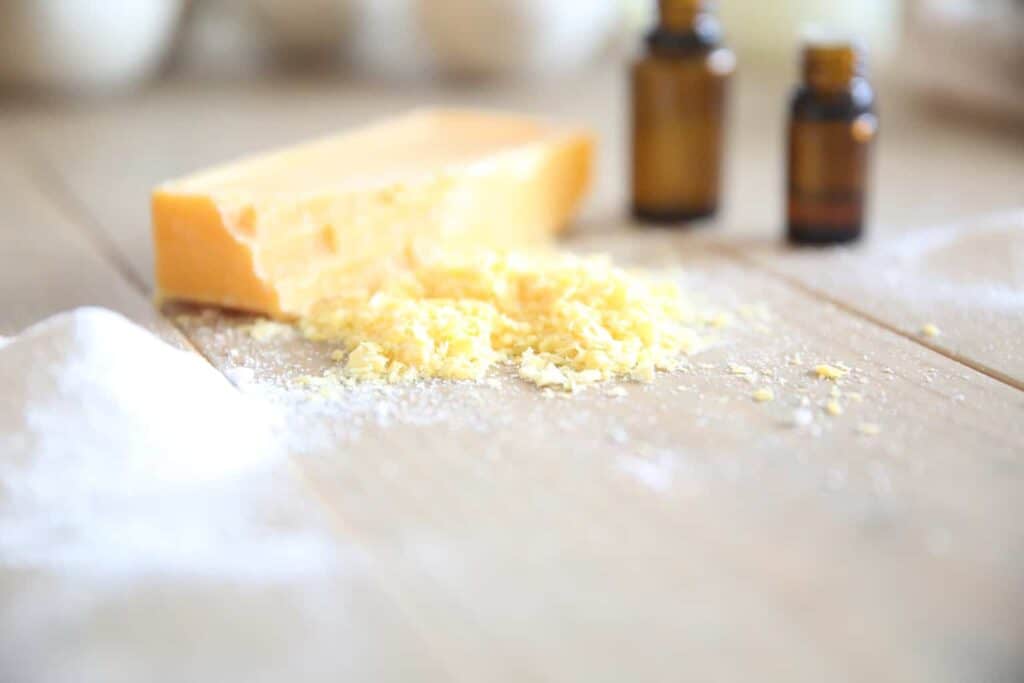
Laundry Detergent Ingredients
- 1 cup borax (buy borax here)
- 1/2 cup washing soda (buy washing soda here)
- 1 Castile Soap Bar or Fels Naptha soap bar, 5 ounces (Or a Homemade Laundry Soap Bar)
- 5-gallon bucket with lid (I use one similar to this one). Any old 5-gallon bucket with a seal will work!
- Box grater ( I use one similar to this one. I keep this one in the laundry room and have a different one for the kitchen)
- 30-50 drops of essential oils of choice (I list my favorites below)
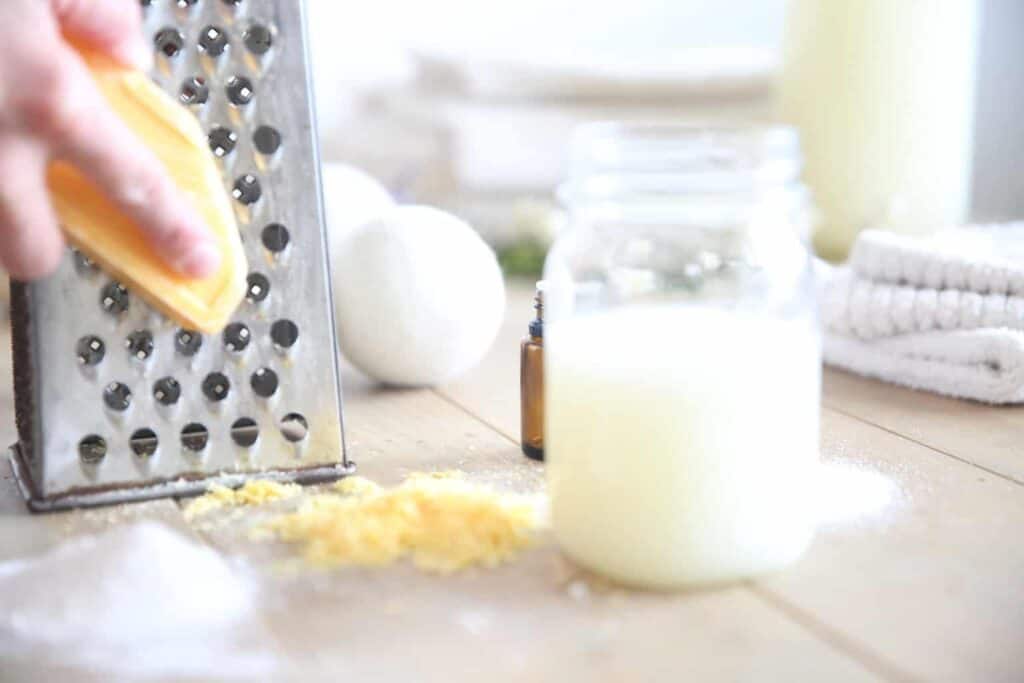
Homemade laundry soap recipe
- Add 1/2 gallon of water to your bucket. Stir in borax and washing soda.
- Shred your soap bar with the cheese grater—melt soap shreds in 1 cup of water on the stove over medium heat. Stir often.
- Add melted soap to the bucket and stir in well.
- Add essential oils of choice. See the lists below!
- Fill the bucket to about 2-3 inches from the top rim. Stir until all the ingredients are well combined.
- Secure the lid, let sit overnight, and then give the bucket one good final shake.
Bonus: I’ve included step by step images below for visual guidance! Or if you would rather watch, scroll down to the recipe card for the complete step by step video tutorial!
NOTES: Transfer the laundry soap to an old laundry detergent container or a ½ gallon mason jar for easy use. Store the remaining bulk soap out of the way. Shake well before each load and use about ¼ cup of detergent per wash.
Step by step images
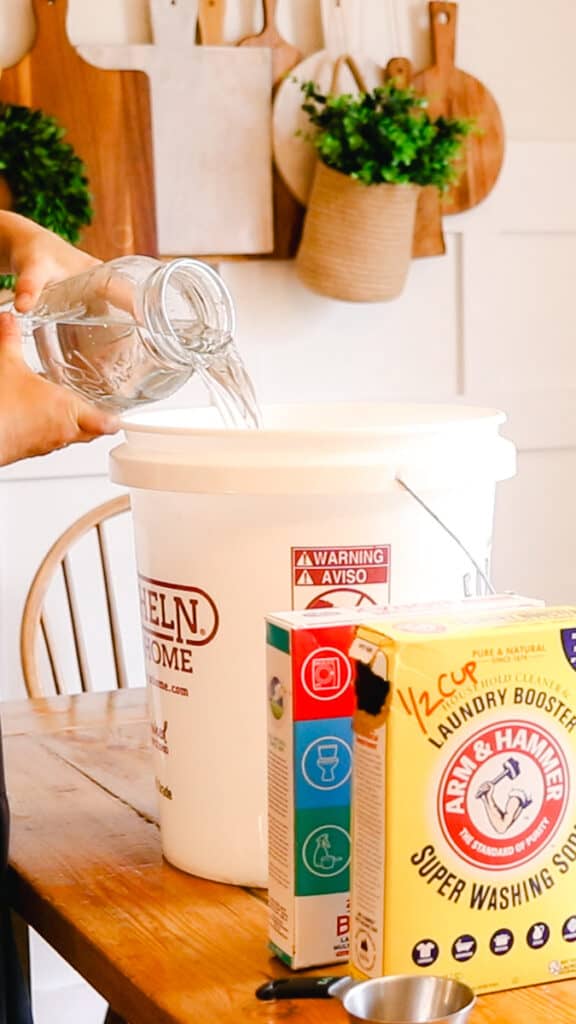
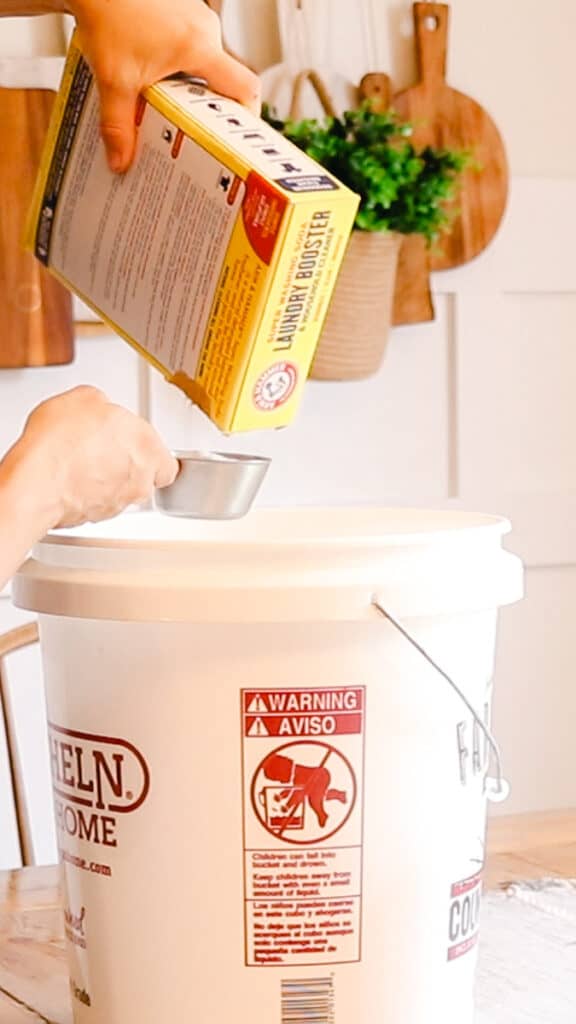
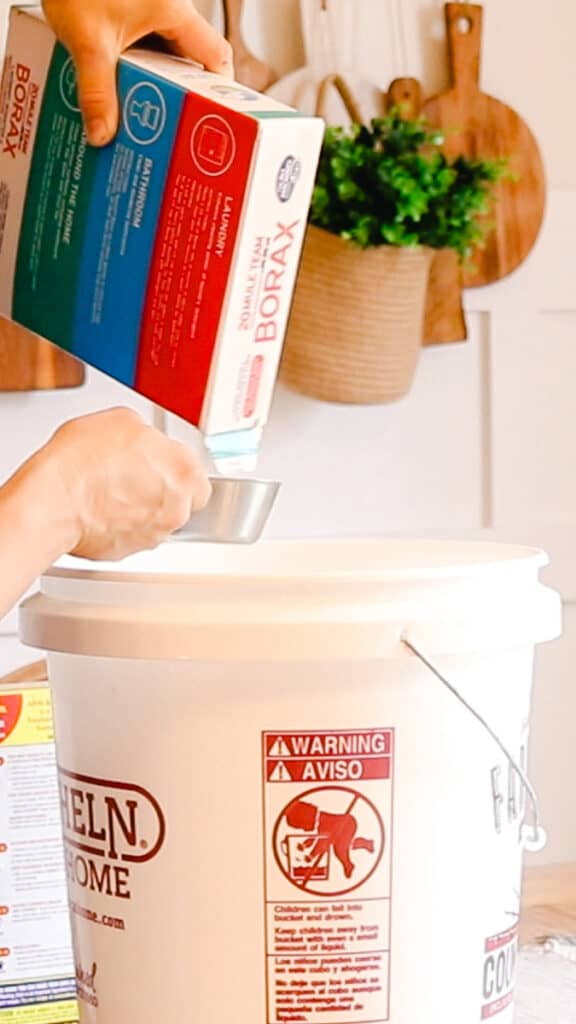
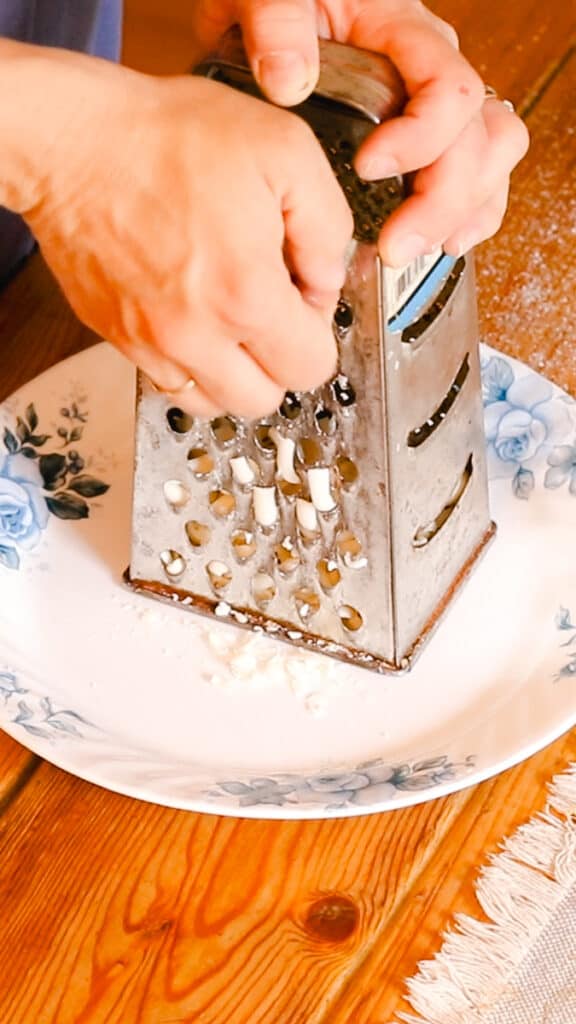
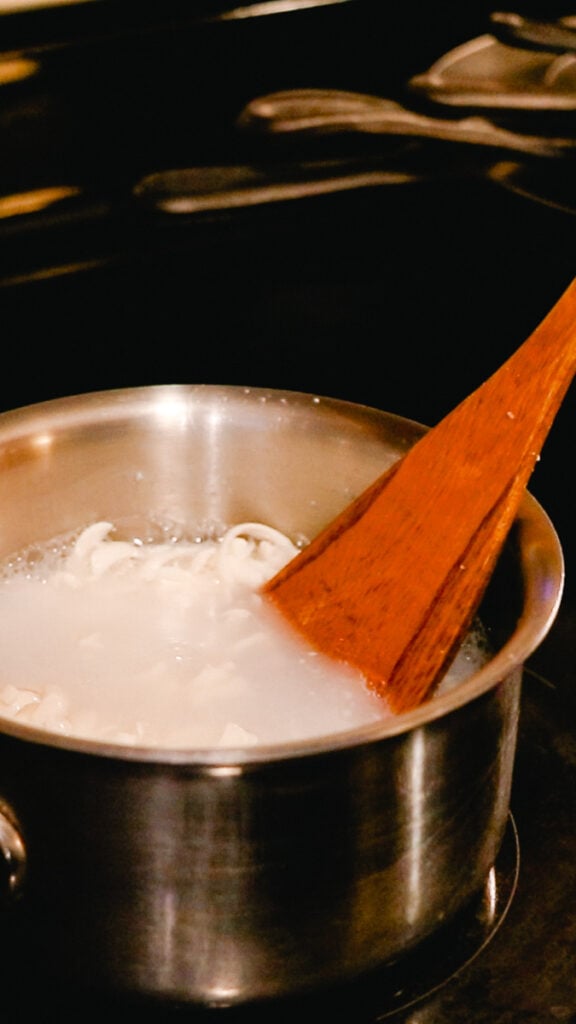
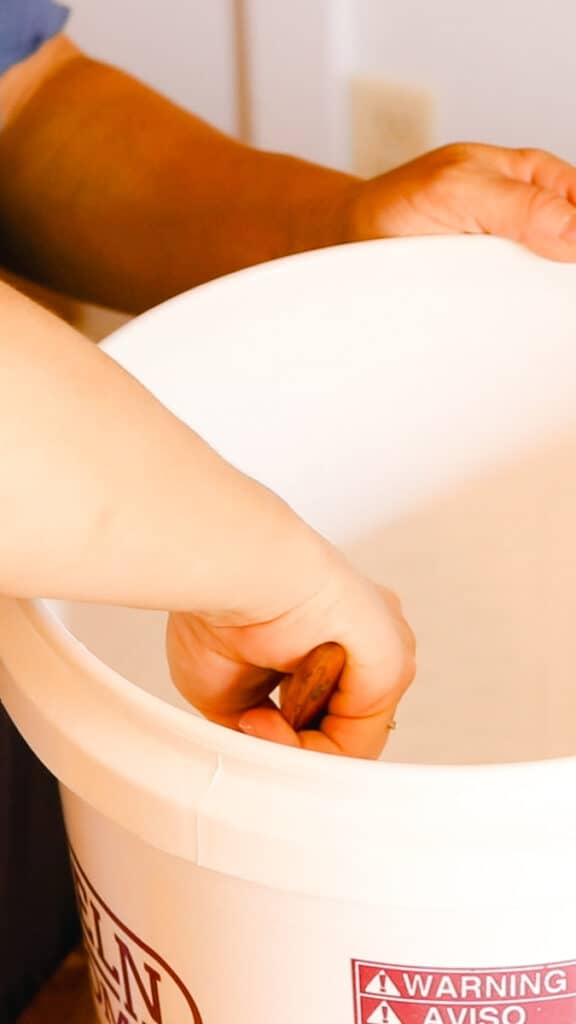
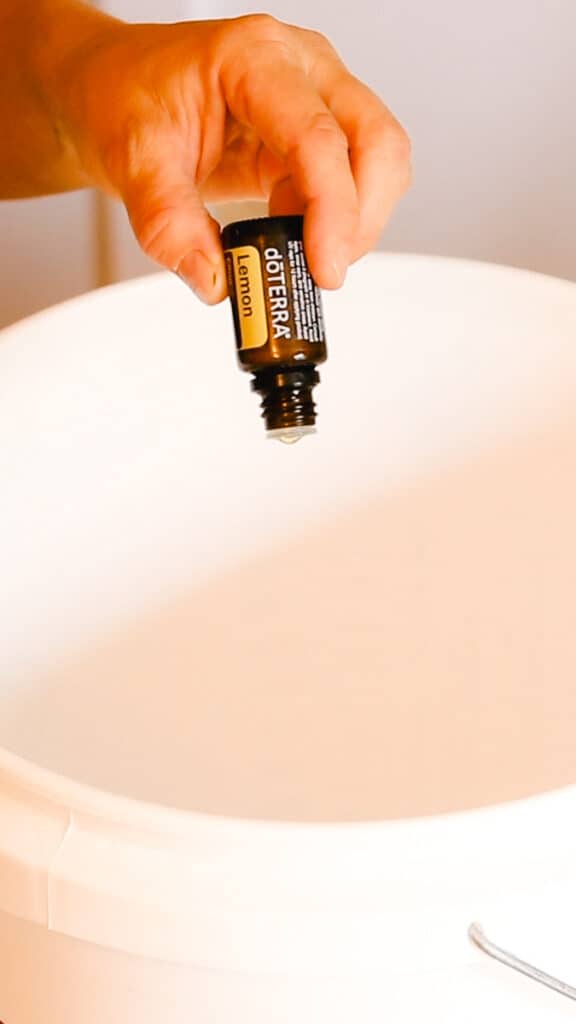
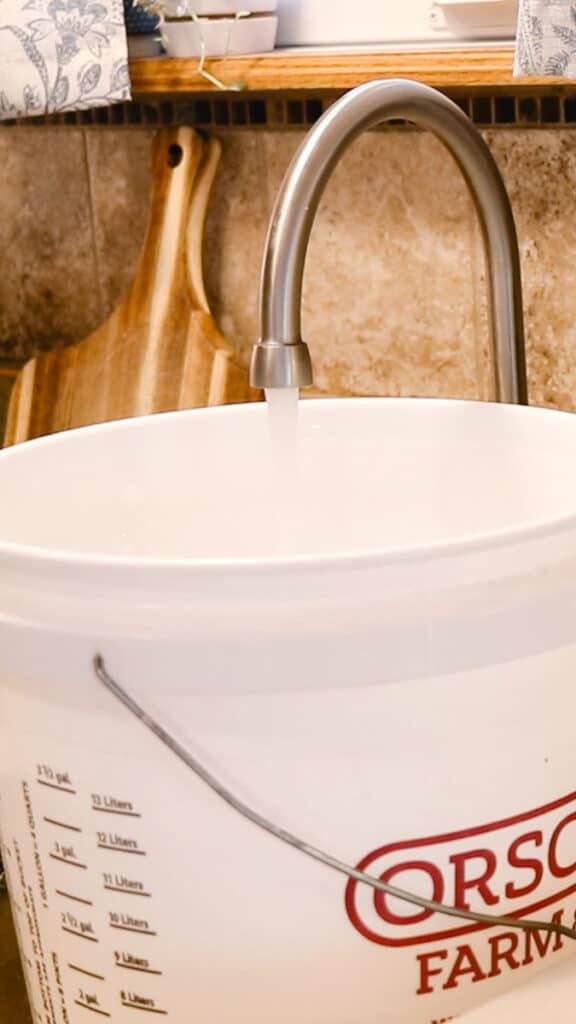
How natural is this laundry soap?
I try to make my DIYs as natural as possible without sacrificing their effectiveness.
And while I believe everything in this recipe is safe, I have included a few resources to help you decide if this recipe is right for you.
Borax: This ingredient gets a pretty bad rap and scores rather low on the EWG scale. Unfortunately, most studies on the effects of borax have been in its pure state when used topically. However, I have not found any harmful side effects when safely diluting this product in my laundry soap. Here is a good article on it, and if you would rather leave it out, just use more washing soda to compensate.
Washing Soda: Washing soda helps neutralize odors and remove stains, contributing to a clean and refreshed look for your laundry. Washing soda also scores an A from the EWG.
Castile Soap Bar/Fels Naptha Soap Bar: Fels Naptha is a traditional laundry bar made with ingredients like tallow, coconut oil, and palm oil. It’s particularly effective in tackling tough stains and grime, but is not 100% natural.
I originally used Fels-Naptha in this recipe, but now I exclusively use castile soap. Both work great, so the choice is yours! You will notice the soap will be thicker and more gel-like if you use fels naptha.
Its an eco-friendly choice
Overall, this laundry soap is a low-waste, natural, eco-friendly laundry detergent—at least as much as possible.
Additionally, I try to prioritize sustainability by using reusable containers and naturally sourced essential oils, which significantly reduces single-use plastics.
Oh, and don’t forget to head over to my online resource library for FREE printable labels for this recipe, several others, and several ebooks!
How long does laundry detergent last
Most laundry detergents last anywhere from 6 months to a year after opening. This expiratory period is partly due to the strength of the products, which cannot be guaranteed after that point. i.e., they may lose some of their potency. However, it does not mean the product will spoil after that point.
This laundry soap lasts up to 12 months. Be sure to store out of the sunlight in a climate-controlled environment to reduce the risk of mold. As long as it smells ok, it will be fine to use.
I have actually been asked if this laundry soap would freeze? The answer is YES; it may freeze in frigid temps. The shredded soap bar may lower the freezing point some, but it can still freeze. So make sure you store the bucket indoors!
We do a lot of laundry here, like nearly every day! Yikes! Since this recipe makes approximately 320 loads, it should be enough for a year’s worth of laundry for the average household.
Liquid laundry detergent vs powder
Liquid laundry soap pros: It easily dissolves in cold water, which can save on that electric bill by not using hot water. In some cases, it can be put on the clothes to help in removing stains before running it through the cycle.
Cons: It typically has a shorter shelf life than its powdered detergent cousin, and if you are buying conventional detergents, it’s not the most eco-friendly, being packaged in plastic. Homemade soap, on the other hand, I’ve been using the same bucket for almost 10 years.
Powdered laundry soap pros: It essentially never expires as long as it stays dry. It is extremely concentrated and more powerful, only requiring 2 tbsp per load. Powder laundry soap does not dissolve as easily as liquid, and as a result, may leave a residue on the clothes. An easy fix would be to run the load with hot water, but then there is the potential for higher electric or gas bills!
So, is powder or liquid detergent better? It really comes down to A. personal preference and B. what you are trying to wash. If it’s a regular load of clothes, towels, and washcloths, liquid soap on a cold cycle will be sufficient.
If you have a little one and use cloth diapers or dirty farm clothes, powder laundry detergent run through the hot cycle may be the best option to clean everything.
What about really stinky laundry?
For really, really dirty laundry, like, the stink is embedded into the clothing level of dirty, you may consider laundry scent boosters or laundry stripping. Knowing how to strip laundry is a good know-how but should be reserved only for when it’s necessary.
Laundry stripping can also help with mineral/residue buildup in towels, washcloths, and bedding, which can be caused by hard water or laundry detergent residue.
How to strip laundry
Fill a tub or sink with hot water. Stir in a dash of borax and washing soda, then gently place the laundry in the water, fully submerging. Let it sit for 3-5 hours. Run the laundry through the rinse cycle only, don’t add any detergent, and then dry.
Will homemade laundry soap ruin the washer?
I personally have experienced zero issues in the last ten years, using the exact recipe below in my Bosh HE washer. Use your own discretion when using natural laundry soaps.
BEST ESSENTIAL OILS FOR LAUNDRY SOAP
LAVENDER: Lavender is a very calming, relaxing essential oil with a lovely floral smell. This one is my favorite oil to use on its own for laundry soap.
WILD ORANGE: Invigorating, uplifting, and cleansing, wild orange is perfect for laundry soap. It adds a fresh scent to clean clothes.
TEA TREE: Tea tree is a purifying and cleansing essential oil. If you ever forget to put wet laundry straight in the dryer when it is done, add 2-3 drops to the wet clothes before tossing into the dryer. It is a great oil for getting rid of mildew odors.
PEPPERMINT: If you like a fresh, minty scent, then this will be your oil. Peppermint adds a sharp aroma to your homemade laundry soap.
EUCALYPTUS: Eucalyptus is another excellent oil to add to your laundry soap. This oil will both freshen clothes and create a beautiful aroma.
LEMONGRASS: Distilled from fresh lemongrass in Southern India, this citrus oil has an earthy hint of lemon-like scent. It has a tremendous all-around aroma, especially liked among men.
ROMAN CHAMOMILE: Another calming essential oil and great for kids. Roman chamomile adds a beautiful floral scent.
CEDARWOOD: Another one for the men in your life. Cedarwood has a woodsy scent that appeals to most men. Its cleansing properties make it a great addition to this recipe or any soap bar recipe.
PATCHOULI: Either you love it or hate it. I am a patchouli lover and am obsessed with the scent. However, if you’re unfamiliar with the scent, I’d suggest taking a whiff before adding it to 5 gallons worth of laundry soap!
JASMINE: If you want to smell like a bed of flowers all day, then add jasmine to your laundry soap. Jasmine is very calming and can help with stress and anxious feelings.
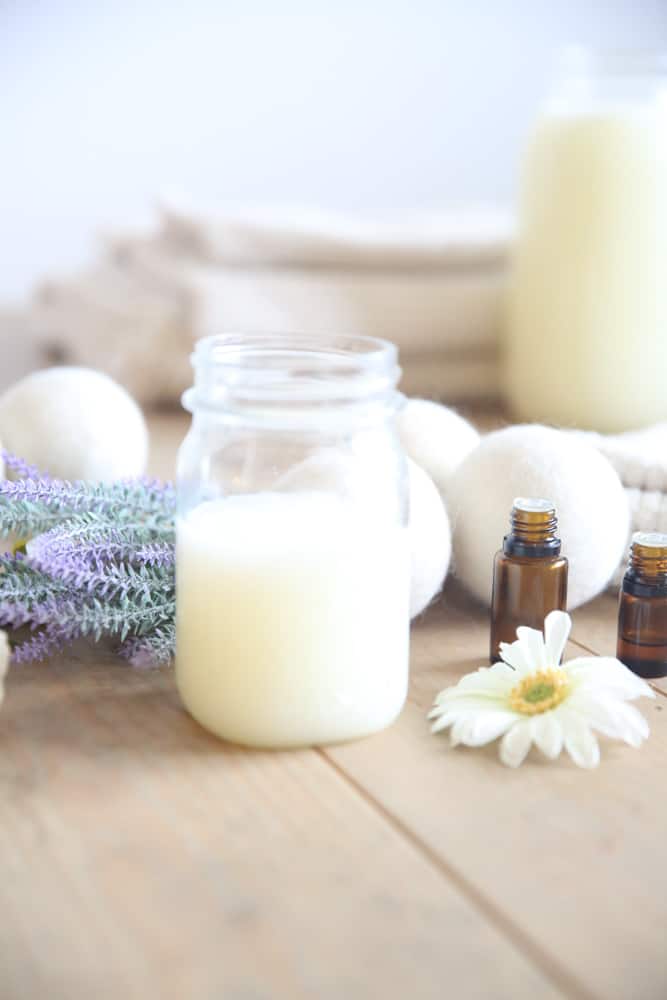
Essential oil blends
CITRUS BLISS
- 20 drops orange
- 15 drops lemon
- 10 drops lime
- 5 drops grapefruit
FLORAL SENSATION
- 20 drops lavender
- 15 drops jasmine
- 10 drops patchouli
- 5 drops clary sage
GENTLE BABY
- 25 drops lavender
- 10 drops roman chamomile
ODOR CONTROL
- 20 drops eucalyptus
- 15 drops tea tree
- 10 drops lemon
- 5 drops peppermint
Bonus Recipes For all Your Laundry Needs
HOMEMADE FABRIC SOFTENER
Having a fabric softener to add either in the form of a liquid to the washing machine or dryer sheets for the dryer is a great option for reducing wrinkles and static and adding a fresh scent to the laundry.
INGREDIENTS
- 1/2 gallon white vinegar
- 1 cup baking soda
- 10 drops of clove essential oil
- 5 drops of lemon essential oil
INSTRUCTIONS
- Combine all the ingredients in a gallon-size container.
- Shake until well mixed.
- Add 1/4 cup to each load as needed.
HOMEMADE ALL-NATURAL BLEACH
INGREDIENTS
- 1/4 cup hydrogen peroxide
- 10 drops of lemon essential oil
INSTRUCTIONS
Mix ingredients together and add to the bleach compartment of the washing machine when needed.
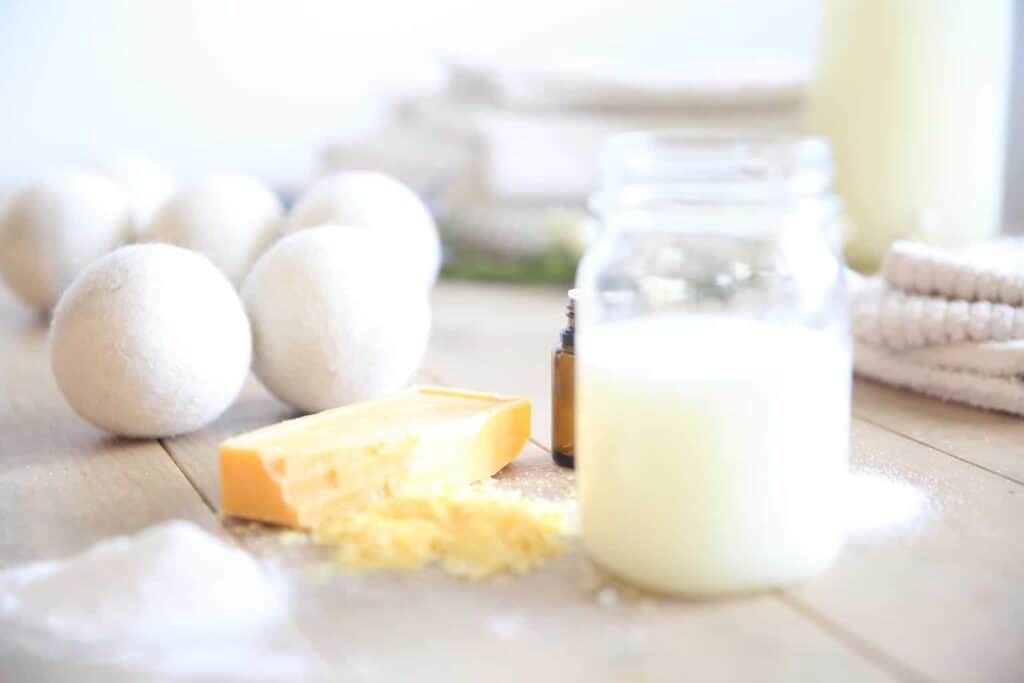
DRYER BALLS
Real-wool dryer balls are a simple, non-toxic way to soften fabrics.
Dryer balls are generally made from compacted wool and help separate the layers of laundry during the drying cycle, which allows for better airflow between the fabrics and even reduces drying times, saving you money!
Add a few drops of lavender or wild orange essential oil or scent them with dried herbs to leave clothes with a lovely, fresh scent.
Get your dryer balls HERE.
I hope this post was helpful and that you will find these recipes useful.
More popular DIY recipes
- DIY DETANGLER SPRAY
- DIY LIP BALM
- SHOWER MELTS
- HOMEMADE DEODORANT
- DIY DRY SHAMPOO FOR LIGHT AND DARK HAIR
- NATURAL CLEANING PRODUCTS
- SEA SALT SPRAY FOR WAVY HAIR
- GEL DISH SOAP
If you made this recipe and loved it, I would love for you to come back and give it 5 stars!
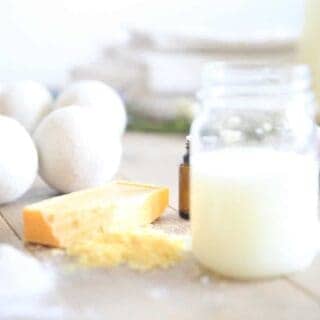
Homemade Laundry Soap
Equipment
Ingredients
- 1 cup Borax
- ½ cup washing soda
- 5 ounces fels naptha soap or castile soap bar 1 soap bar
- 20 drops of orange essential oil
- 15 drops of lemon essential oil
- 10 drops of lime essential oil
- 5 drops of grapefruit essential oil
- 5 gallons of water approximately
Instructions
- Add 1/2 gallon of water to your bucket, stir in washing soda and borax.
- Shred soap bar using a box grater.
- Melt soap shreds in 1 cup of water on the stove over medium heat. Stir often until melted.
- Add the melted soap to the bucket and stir in well.
- Stir in essential oils.
- Fill the rest of the way with water to about 3 inches from the top.
- Secure lid, let it sit overnight, then give it a good shake before using.
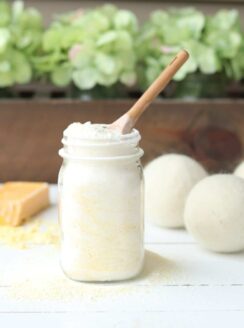
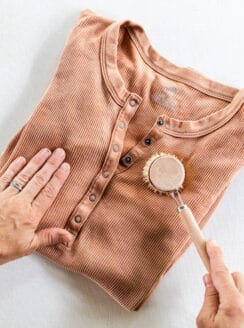
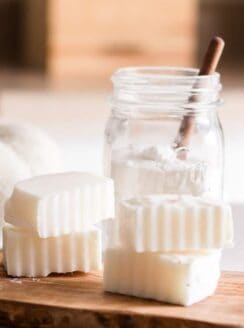
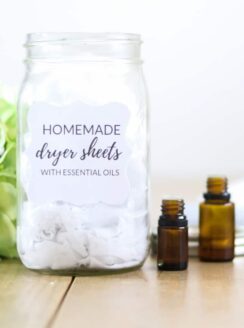
Cathy Mallow says
Can you tell me if thos soap recipe is ok to use in a from loading machine that calls for he (high efficiency) soap?
Elizabeth Husom says
Do you have an idea for non-glass storage? I’ve found it separates in plastic, but people with small children and/or who use the laundromat often don’t want to use glass.
Laura says
Stainless steel possibly?
Elizabeth Husom says
Hello-Thanks for the article. I make my own soap, and prefer the powder, simply because I like powder. I make them both, and tend to use the liquid directly on stains instead of Shout. Fels Naptha has been hard to find at times, so I’ve used Castile soap with good results. I’ve also baked sodium bicarbonate (washing soda) to make sodium carbonate (washing soda) a couple of times when washing soda has been hard to find locally or price-hiked online. There are recipes on Pinterest with directions. Some people have indicated homemade laundry soap isn’t good for clothes and/or washers, but I’ve had no trouble in 7 years.
Angela says
Hi, I made this soap last night but it’s very watery. What did I do wrong? My soap bar took a long time to melt. Thanks!
Laura says
That’s normal, allow it to sit and then shake well.
Sarah Drake says
How do I persevere liquid laundry soap?
Laura says
I have never added one and it last at least a year!
Barbara Rucker says
Hi Laura, I like using your liquid laundry soap, but I use a lot of coconut, jojoba, and other oils on my skin, which gets into my clothes, and leaves an oily residue in my washing machine after I wash them. Is there another ingredient I can add to the basic formula to also keep the oils from coating my washing machine, and also my clothes?
Would adding the homemade natural bleach to each load of wash I do be the solution to the problem? Is this bleach safe to use on all clothes?
Thanks, Laura, I love using your DIY natural products for everything – both personal and for house, car, etc. !
Elizabeth Husom says
Hi Barbara-I make both the liquid and powdered soaps, and prefer powdered soap just because I like powder. I’ve not added an ingredient to the liquid because people have said adding ingredients directly to the liquid could cause a variety of issues. BUT: you could try adding a homemade or store bought natural laundry booster, cup of baking soda or citric acid in your wash when you add the liquid. I say this because I also use these oils on my skin. On my powdered soap, I add both baking soda and oxiclean to the recipe and have never had oil residue on the washer or clothes.
Clare says
ANOTHER great recipe…this is saving me money…this soap is comparable to what I was using….I have hard water and this soap works great!
Thank you very much:)
DIVYA says
Hi Laura,
I am not from America and I am having a hard time understanding the measurements in metric measurements; I tried decoding it by conversions but was not able to get it.
If possible from your end, please provide metric measurements.
Sue says
Does essential oils spot on the clothes?
Laura says
I have never had that problem
Victoria says
The powdered soap dissolves beautifully and my clothes come out nice and bright. We have hard water and the towels come out nice and soft. Love this recipe. Thank you.
Rachel says
Hi Laura!
I’ve been using this for a little over a year. Long story short, I love it, but our bucket lid broke and things got into the laundry soap, so I’m having to throw out what’s left. Can you tell me the best way to dispose of this soap batch? Can it go down the drain or will it solidify and cause problems? Thanks!
Coleen says
Hello Laura, thank you so much for all of your recipes. I’ve done some research and it states that fels napatha soap is extremely toxic. Is there anything else you can use or would suggest?
Laura says
You can make your own laundry soap bar, I have the recipe for it on my blog.
Jill says
Hi Laura! I was wondering about the fels naptha bar…it contains talc, titanium dioxide, and fragrance. I was wondering what your thoughts were on that. I read that you said to have researched the soap bar and have found it to be safe, so I guess I’m wondering what research convinced you? I love your blog and after reading all your posts and recipes for the past several months, I value your opinion very much.
Lastly, if I just can’t seem to bring myself to use fels naptha, can I use a 5 oz Castile soap bar? Will it still work the same? Thanks a bunch
Laura says
You can make your own laundry soap bar if you prefer! I have a recipe for it on my blog.
Catherine says
Thanks for asking this. I was wondering the same thing myself, after a little research!
Rebecca Dyck says
Just to help everyone out don’t add all of the shredded soap at the same time. It’ll clump up and won’t melt